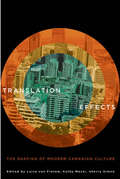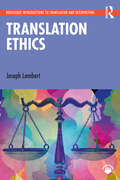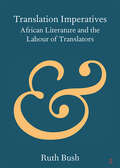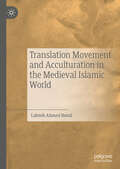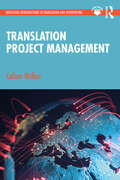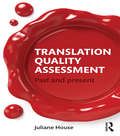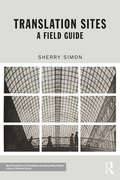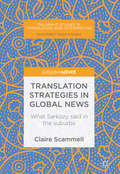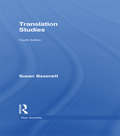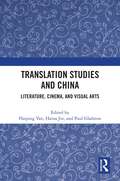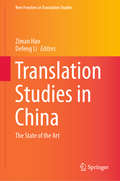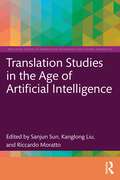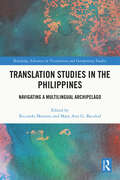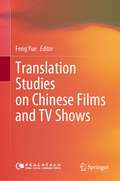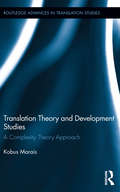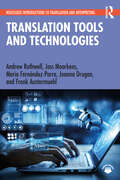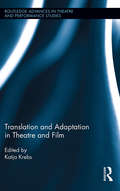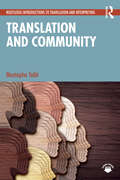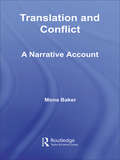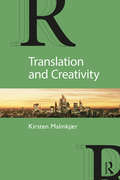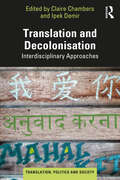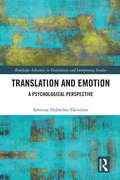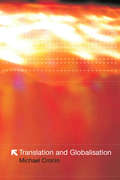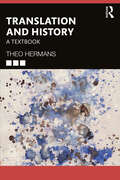- Table View
- List View
Translation Effects
by Luise Von Flotow Sherry Simon Kathy MezeiMuch of Canadian cultural life is sustained and enriched by translation. Translation Effects moves beyond restrictive notions of official translation in Canada, analyzing its activities and effects on the streets, in movie theatres, on stages, in hospitals, in courtrooms, in literature, in politics, and across café tables. The first comprehensive study of the intersection of translation and culture, Translation Effects offers an original picture of translation practices across many languages and through several decades of Canadian life. The book presents detailed case studies of specific events and examines the reverberation and spread of their effects. Through these imaginative, at times unusual, investigations, the contributors unveil the simultaneous invisibility and omnipresence of translation and present a cross-cut of Canadian translation moments. Addressing the period from the 1950s to the present and including a wide scope of examples from medical interpreting to film dubbing, the essays in this book create a panoramic view of the creation of modern culture in Canada. Contributors include Piere Anctil (University of Ottawa), Helene Buzelin (Université de Montréal), Alessndra Capperdoni (Simon Fraser University), Philippe Cardinal, Andrew Clifford (York University), Beverley Curran, Renée Desjardins (University of Ottawa), Ray Ellenwood, David Gaertner, Chantal Gagnon (Université de Montréal), Patricia Godbout, Hugh Hazelton, Jane Koustas (Brock University), Louise Ladouceur ( Université de l'Albera, Gillian Lane-mercier (McGill University), George Lang, Rebecca Margolis, Sophie McCall (Simon Fraser University), Dolmaya McDonough, Denise Merkle (Université de Moncton), Kathy Mezei, Sorouja Moll, Brian Mossop, Daisy Neijmann, Glen Nichols ( Mount Allison University), Joseph Pivato, Gregory Reid, Robert Schwartzwald, Sherry Simon, Luise von Flotow (University of Ottawa), and Christine York.
Translation Effects: The Shaping of Modern Canadian Culture
by Kathy Mezei, Sherry Simon and Luise von FlotowMuch of Canadian cultural life is sustained and enriched by translation. Translation Effects moves beyond restrictive notions of official translation in Canada, analyzing its activities and effects on the streets, in movie theatres, on stages, in hospitals, in courtrooms, in literature, in politics, and across café tables. The first comprehensive study of the intersection of translation and culture, Translation Effects offers an original picture of translation practices across many languages and through several decades of Canadian life. The book presents detailed case studies of specific events and examines the reverberation and spread of their effects. Through these imaginative, at times unusual, investigations, the contributors unveil the simultaneous invisibility and omnipresence of translation and present a cross-cut of Canadian translation moments. Addressing the period from the 1950s to the present and including a wide scope of examples from medical interpreting to film dubbing, the essays in this book create a panoramic view of the creation of modern culture in Canada. Contributors include Piere Anctil (University of Ottawa), Hélène Buzelin (Université de Montréal), Alessandra Capperdoni (Simon Fraser University), Philippe Cardinal, Andrew Clifford (York University), Beverley Curran, Renée Desjardins (University of Ottawa), Ray Ellenwood, David Gaertner, Chantal Gagnon (Université de Montréal), Patricia Godbout, Hugh Hazelton, Jane Koustas (Brock University), Louise Ladouceur (Université de l'Albera, Gillian Lane-Mercier (McGill University), George Lang, Rebecca Margolis, Sophie McCall (Simon Fraser University), Julie Dolmaya McDonough, Denise Merkle (Université de Moncton), Kathy Mezei, Sorouja Moll, Brian Mossop, Daisy Neijmann, Glen Nichols (Mount Allison University), Joseph Pivato, Gregory Reid, Robert Schwartzwald, Sherry Simon, Luise von Flotow (University of Ottawa), and Christine York.
Translation Ethics (Routledge Introductions to Translation and Interpreting)
by Joseph LambertTranslation Ethics introduces the topic of ethics for students, researchers, and professional translators. Based on a successful course and written by an experienced instructor, the Introduction and nine core chapters offer an accessible examination of a wide range of interlocking topic areas, which combine to form a cohesive whole, guiding students through the key debates. Built upon a theoretical background founded in philosophy and moral theory, it outlines the main contributions in the area and traces the development of thought on ethics from absolutism to relativism, or, from staunchly-argued textual viewpoints to current lines of thought placing the translator as agent and an active – even interventionary – mediator. The textbook then examines the place of ethical enquiry in the context of professional translation, critiquing provision such as codes of ethics. Each chapter includes key discussion points, suggested topics for essays, presentations, or in-class debates, and an array of contextualised examples and case studies. Additional resources, including videos, weblinks, online activities, and PowerPoint slide presentations on the Routledge Translation studies portal provide valuable extra pedagogical support. This wide-ranging and accessible textbook has been carefully designed to be key reading for a wide range of courses, including distance-learning courses, from translation and interpreting ethics to translation theory and practice.
Translation Imperatives: African Literature and the Labour of Translators (Elements in Publishing and Book Culture)
by Ruth BushThis Element explores the politics of literary translation via case studies from the Heinemann African Writers Series and the work of twenty-first-century literary translators in Cameroon. It intervenes in debates concerning multilingualism, race and decolonization, as well as methodological discussion in African literary studies, world literature, comparative literature and translation studies. The task of translating African literary texts has developed according to political and socio-economic contexts. It has contributed to the consecration of a canon of African classics and fuelled polemics around African languages. Yet retranslation remains rare and early translations are frequently criticised. This Element's primary focus on the labour rather than craft or art of translation emphasises the material basis that underpins who gets to translate and how that embodied labour occurs within the process of book production and reception. The arguments draw on close readings, fresh archival material, interviews, and co-production and observation of literary translation workshops.
Translation Movement and Acculturation in the Medieval Islamic World
by Labeeb Ahmed BsoulThis book investigates the transmission of knowledge in the Arab and Islamic world, with particular attention to the translation of material from Greek, Persian, and Sanskrit into Arabic, and then from Arabic into Latin in medieval Western Europe. While most modern scholarly works have addressed contributions of Muslim scholars to the modern development of translation, Labeeb Ahmed Bsoul bases his study on Arabic classical literature and its impact upon modern translation. He focuses on the contributions made by prominent classical Christian and Muslim scholars, showcasing how their works and contributions to the field of knowledge are still relevant today.
Translation Project Management (Routledge Introductions to Translation and Interpreting)
by Callum WalkerThis textbook provides a comprehensive overview of the processes, principles, and constraints of project management in the translation industry. It offers readers clear insights into modern-day project management practices specific to translation services and an understanding of critical inter-related aspects of the process, drawing on key works in business studies on management, aspects of economics relevant to project management, and international standards on project management processes. Developed on the back of a successful module titled Intercultural Project Management, Translation Project Management provides a coherent account of the entire translation project management lifecycle from start to finish and pays considerable attention to the factors influencing decision- making at various stages and how external forces shape the way in which a translation project plays out. Through an array of real-world case studies, it offers readers opportunities to explore, analyse, and engage with six fundamental project constraints: cost, time, scope, quality, benefits, and risk. Each chapter offers discussion points, possible assignments, and guided further reading. This is an essential textbook both for all project management courses within translation studies programmes and for professional translators and translation service providers.
Translation Quality Assessment: Past and Present
by Juliane HouseTranslation Quality Assessment has become one of the key issues in translation studies. This comprehensive and up-to-date treatment of translation evaluation makes explicit the grounds of judging the worth of a translation and emphasizes that translation is, at its core, a linguistic art. Written by the author of the world’s best known model of translation quality assessment, Juliane House provides an overview of relevant contemporary interdisciplinary research on intercultural communication and globalization research, corpus and psycho- and neurolinguistic studies. House also acknowledges the importance of socio-cultural and situational context in which texts are embedded, and which need to be analysed when they are transferred through space and time in acts of translation but also highlights the linguistic art form of translation. The text includes a newly revised and presented model of translation quality assessment which, like its predecessor, relies on detailed textual and culturally informed contextual analysis and comparison. The test cases also show that there are two steps in translation evaluation: firstly analysis, description and explanation; secondly, judgements of value, socio-cultural relevance and appropriateness. The second is futile without the first: to judge is easy, to understand less so. Translation Quality Assessment is an invaluable resource for students and researchers of Translation Studies and Intercultural Communication, as well as for professional translators.
Translation Sites: A Field Guide (New Perspectives in Translation and Interpreting Studies)
by Sherry SimonIn Translation Sites, leading theorist Sherry Simon shows how the processes and effects of translation pervade contemporary life. This field guide is an invitation to explore hotels, markets, museums, checkpoints, gardens, bridges, towers and streets as sites of translation. These are spaces whose meanings are shaped by language traffic and by a clash of memories. Touching on a host of issues from migration to the future of Indigenous cultures, from the politics of architecture to contemporary metrolingualism, Translation Sites powerfully illuminates questions of public interest. Abundantly illustrated, the guidebook creates new connections between translation studies and memory studies, urban geography, architecture and history. This ground-breaking book is both an engaging read for a wide-ranging audience and an important text in broadening the scope of translation studies.
Translation Strategies in Global News: What Sarkozy Said In The Suburbs (Palgrave Studies in Translating and Interpreting)
by Claire ScammellThis book analyses the translation strategies employed by journalists when reporting foreign news events to home audiences. Using English-language press coverage of inflammatory comments made by Nicolas Sarkozy in his role as French interior minister in 2005 as a case study, the author illustrates the secondary level of mediation that occurs when news crosses linguistic and cultural borders. This critical analysis examines the norm for ‘domesticating’ news translation practices and explores the potential for introducing a degree of ‘foreignisation’ as a means to facilitating cross-cultural engagement and understanding. The book places emphasis on foreign-language quotation and culture-specific concepts as two key sites of translation in the news, and addresses a need for research that clarifies where translation, as a distinct part of the newswriting process, occurs. The interdisciplinary nature of this book will appeal to a broad range of readers, in particular scholars and students in the fields of translation, media, culture and journalism studies.
Translation Studies (New Accents)
by Susan BassnettAt a time when millions travel around the planet – some by choice, some driven by economic or political exile – translation of the written and spoken word is of ever increasing importance. This guide presents readers with an accessible and engaging introduction to the valuable position translation holds within literature and society. Leading translation theorist Susan Bassnett traces the history of translation, examining the ways translation is currently utilized as a burgeoning interdisciplinary activity and extending her analysis into developing areas such as developing technologies and new media forms. Translation Studies, fourth edition displays the importance of translation across disciplines, and is essential reading for students and scholars of translation, literary studies, globalisation studies and ancient and modern languages.
Translation Studies and China: Literature, Cinema, and Visual Arts
by Haiping YanFocusing on transculturality, this edited volume explores how the role of translation and the idea of (un)translatability in the transformative complementation of different civilizations facilitates the transcultural connection between Chinese and other cultures in the modern era. Bringing together established international scholars and emerging new voices, this collection explores the linguistic, social, and cultural implications of translation and transculturality. The 13 chapters not only discuss the translation of literature, but also break new ground by addressing the translation of cinema, performance, and the visual arts, which are active bearers of modern and contemporary culture that are often neglected by academics. Through an engagement with these diverse fields, the title aims not only to reflect on how translation has reproduced values, concepts, and cultural forms, but also to stimulate the emergence of new possibilities in the dynamic transcultural interplay between China and the diverse national, cultural-linguistic, and contexts of Europe, the Americas, and Asia. It shows how cultures have been appropriated, misunderstood, transformed, and reconstructed through processes of linguistic mediation, as well as how knowledge, understanding, and connections have been generated through transculturality. The book will be a must read for scholars and students of translation studies, transcultural studies, and Chinese studies.
Translation Studies in China: The State of the Art (New Frontiers in Translation Studies)
by Defeng Li Ziman HanThis book features the latest research on translation by a dozen leading scholars of translation studies in China. The themes discussed are diverse, and include: translation policy, literary translation, medical translation, corpus translation studies, teaching translation, translation technologies, media translation, interpreting studies and so on. The contributors are all respected experts on their respective topics. The book reflects the state-of-the-art of translation studies in China, and offers a unique window on the latest thoughts on translation there.
Translation Studies in the Age of Artificial Intelligence (Routledge Studies in Translation Technology)
by Kanglong Liu Riccardo Moratto Sanjun SunSun, Liu, Moratto, and the team of contributors provide an in-depth exploration of the implications of artificial intelligence (AI) in the ever-evolving field of translation studies.With key insights to inform future research on this rapidly evolving field in translation, this book offers a comprehensive understanding of the implications of AI, particularly ChatGPT, across technical, pedagogical, and ethical dimensions. From the evolution of translation competence and quality assessment to methodological shifts in research and pedagogy, the authors shed light on the capabilities and limitations of AI, offering insights into its potential within the realm of translation studies. With fresh perspectives on the intersection of AI and translation studies, the chapters cover critical topics such as evaluating translation quality, translator training, corpus translation studies, and ethical considerations in translation education.By systematically unpacking the implications of AI, this book offers valuable insights for researchers, educators, and practitioners interested in translation and interpreting studies, machine-learning, and the role of AI in translator training and education.
Translation Studies in the Philippines: Navigating a Multilingual Archipelago (Routledge Advances in Translation and Interpreting Studies)
by Riccardo Moratto Mary Ann G. BacolodThe contributors to this book examine the state, development, issues, practices, and approaches to translation studies in the Philippines. The Philippines is a highly multilingual country, with many indigenous languages and regional dialects spoken alongside foreign imports, particularly English and Spanish. Professor Moratto, Professor Bacolod, and their contributors analyse the different roles that translation plays across an extensive range of areas, including disaster mitigation, crisis communication, gender bias, marginalization of Philippine languages, academe, and views on sex, gender, and sexuality. They look at a range of different types of translation, from the translation of biblical texts to audio-visual translation and machine translation. Emphasising the importance of translation as an interdisciplinary field, they use a variety of analytic lenses, including anthropological linguistics, language and culture studies, semantics, structural linguistics, and performance arts, among others. A comprehensive resource for scholars and practitioners of translation, as well as a valuable reference for scholars across a wider range of humanities and social science disciplines in examining the culture, language, and society of the Philippines.
Translation Studies on Chinese Films and TV Shows
by Feng YueThis book explores translation strategies for films and TV programs. On the basis of case studies on subtitle translations, it argues that translators are expected to take into consideration not only linguistic and cultural differences but also the limits of time and space. Based on the editor’s experience working as a translator for TV, journalist, and narrator, this book proposes employing editorial translation for TV translation. Further, in light of statistics on international audiences’ views on Chinese films, it suggests striking a balance between conveying cultural messages and providing good entertainment.
Translation Theory and Development Studies: A Complexity Theory Approach (Routledge Advances in Translation and Interpreting Studies)
by Kobus MaraisThis book aims to provide a philosophical underpinning to translation and relate translation to development. The second aim flows from the first section’s argument that societies emerge out of, amongst others, complex translational interactions amongst individuals. It will do so by conceptualising translation from a complexity and emergence point of view and relating this view on emergent semiotics to some of the most recent social research. It will further fulfill its aims by providing empirical data from the South African context concerning the relationship between translation and development. The book intends to be interdisciplinary in nature and to foster interdisciplinary research and dialogue by relating the newest trends in translation theory, i.e. agency theory in the sociology of translation, to development theory within sociology. Data in the volume will be drawn from fields that have received very little if any attention in translation studies, i.e. local economic development, the knowledge economy and the informal economy.
Translation Tools and Technologies (Routledge Introductions to Translation and Interpreting)
by Andrew Rothwell Joss Moorkens Joanna Drugan María Fernández-Parra Frank AustermuehlTo trainee translators and established professionals alike, the range of tools and technologies now available, and the speed with which they change, can seem bewildering. This state-of-the-art, copiously illustrated textbook offers a straightforward and practical guide to translation tools and technologies. Demystifying the workings of computer-assisted translation (CAT) and machine translation (MT) technologies, Translation Tools and Technologies offers clear step-by-step guidance on how to choose suitable tools (free or commercial) for the task in hand and quickly get up to speed with them, using examples from a wide range of languages. Translator trainers will also find it invaluable when constructing or updating their courses. This unique book covers many topics in addition to text translation. These include the history of the technologies, project management, terminology research and corpora, audiovisual translation, website, software and games localisation, and quality assurance. Professional workflows are at the heart of the narrative, and due consideration is also given to the legal and ethical questions arising from the reuse of translation data. With targeted suggestions for further reading at the end of each chapter to guide users in deepening their knowledge, this is the essential textbook for all courses in translation and technology within translation studies and translator training. Additional resources are available on the Routledge Translation Studies Portal.
Translation and Adaptation in Theatre and Film (Routledge Advances in Theatre & Performance Studies)
by Katja KrebsThis book provides a pioneering and provocative exploration of the rich synergies between adaptation studies and translation studies and is the first genuine attempt to discuss the rather loose usage of the concepts of translation and adaptation in terms of theatre and film. At the heart of this collection is the proposition that translation studies and adaptation studies have much to offer each other in practical and theoretical terms and can no longer exist independently from one another. As a result, it generates productive ideas within the contact zone between these two fields of study, both through new theoretical paradigms and detailed case studies. Such closely intertwined areas as translation and adaptation need to encounter each other’s methodologies and perspectives in order to develop ever more rigorous approaches to the study of adaptation and translation phenomena, challenging current assumptions and prejudices in terms of both. The book includes contributions as diverse yet interrelated as Bakhtin’s notion of translation and adaptation, Bollywood adaptations of Shakespeare’s Othello, and an analysis of performance practice, itself arguably an adaptive practice, which uses a variety of languages from English and Greek to British and International Sign-Language. As translation and adaptation practices are an integral part of global cultural and political activities and agendas, it is ever more important to study such occurrences of rewriting and reshaping. By exploring and investigating interdisciplinary and cross-cultural perspectives and approaches, this volume investigates the impact such occurrences of rewriting have on the constructions and experiences of cultures while at the same time developing a rigorous methodological framework which will form the basis of future scholarship on performance and film, translation and adaptation.
Translation and Community (Routledge Introductions to Translation and Interpreting)
by Mustapha TaibiCommunity, or public service, translation contributes to a more equitable and sustainable community by empowering minority groups such as migrants and refugees and is a growing area for both teaching and research within translation studies.Written by a leading authority with over 20 years of teaching experience and in consultation with a range of academics running major courses across the globe, this is the first accessible and interactive introductory textbook to this growing area. It provides step-by-step guidance to students undertaking an undergraduate or postgraduate course covering community translation, public service translation, translation as social action or translation as a social service in multilingual and multicultural societies. The book covers key issues in this area of translation practice, including its distinctive features, challenges and requirements, role and ethical issues, common text types, translation strategies, translation revision and quality assurance and relationships with end users.Including examples of a range of different text types, suggested activities and readings at the end of each chapter and additional resources and activities on the Routledge Translation Studies portal, this is the essential introduction for all students of community and public service translation.
Translation and Conflict: A Narrative Account (Routledge Translation Classics Ser.)
by Mona BakerTranslation and Conflict demonstrates that translators and interpreters participate in circulating as well as resisting the narratives that create the intellectual and moral environment for violent conflict. Drawing on narrative theory and using numerous examples from historical and contemporary conflicts, the author provides an original and coherent model of analysis that pays equal attention to micro and macro aspects of the circulation of narratives in translation, to translation and interpreting, and to questions of dominance and resistance. The study is particularly significant at this juncture of history, with the increased interest in the positioning of translators in politically sensitive contexts, the growing concern with translators’ and interpreters’ divided loyalties in settings such as Guantanamo, Iraq, Kosovo, and other arenas of conflict, and the emergence of several activist communities of translators and interpreters with highly politicized agendas of their own, including Babels, Translators for Peace, Tlaxcala and ECOS. Including further reading suggestions at the end of each chapter, Translation and Conflict will be of interest to students of translation, intercultural studies and sociology as well as the reader interested in the study of social and political movements.
Translation and Creativity
by Kirsten MalmkjærKirsten Malmkjær argues that translating can and should be considered a valuable art form. Examining notions of creativity and their relationship with translation and focusing on how the originality of translation is manifest in texts, the author explores a range of texts and their translations, in order to illustrate original as opposed to derivative translation. With reference to thirty translators’ discourses on their source texts and the author’s own experience of translating a short text, Malmkjær explores the theory of creativity, philosophical aesthetics, the philosophy of language, experimental and theoretical translation studies, and translators’ discourses on their work. Showing the relevance of these varied topics to the study of translating and translations underlines their complexity and the immensity of understanding that is regularly invested in translations. This work proposes a complete rethinking of the concepts of creativity and originality, as applied to translation, and is vital reading for advanced students and researchers in translation studies and comparative literature.
Translation and Decolonisation: Interdisciplinary Approaches (Translation, Politics and Society)
by Claire Chambers Ipek DemirTranslation and Decolonisation: Interdisciplinary Approaches offers compelling explorations of the pivotal role that translation plays in the complex and necessarily incomplete process of decolonisation. In a world where translation has historically been a tool of empire and colonisation, this collection shines the spotlight on the potential for translation to be a driving force in decolonial resistance. The book bridges the divide between translation studies and the decolonial turn in the social sciences and humanities, revealing the ways in which translation can challenge colonial imaginaries, institutions, and practice, and how translation opens up South-to-South conversations. It brings together scholars from diverse disciplines and fields, including sociology, literature, languages, migration, politics, anthropology, and more, offering interdisciplinary approaches and perspectives. By examining both the theoretical and practical aspects of this intersection, the chapters of this agenda-setting collection explore the impact of translation on decolonisation and highlight the need to decolonise translation studies itself. The book illuminates the transformative power of translation in transcending linguistic, cultural, and political boundaries.
Translation and Emotion: A Psychological Perspective (Routledge Advances in Translation and Interpreting Studies)
by Séverine Hubscher-DavidsonThis volume tackles one of the most promising and interdisciplinary developments in modern Translation Studies: the psychology of translation. It applies the scientific study of emotion to the study of translation and translators in order to shed light on how emotions can impact decision-making and problem-solving when translating. The book offers a new critical approach to the study of emotion in translation by analysing translators' accounts of their experiences, as well as drawing on a case study of emotional intelligence involving 155 professional translators. The author identifies three distinctive areas where emotions influence translators: emotional material contained in source texts, their own emotions, and the emotions of source and target readers. In order to explore the relevance and influence of emotions in translation, each chapter focuses on a different emotion trait: emotion perception, emotion regulation, and emotion expression.
Translation and Globalization
by Michael CroninTranslation and Globalization is essential reading for anyone with an interest in translation, or a concern for the future of our world's languages and cultures. This is a critical exploration of the ways in which radical changes to the world economy have affected contemporary translation.The Internet, new technology, machine translation and the emergence of a worldwide, multi-million dollar translation industry have dramatically altered the complex relationship between translators, language and power. In this book, Michael Cronin looks at the changing geography of translation practice and offers new ways of understanding the role of the translator in globalized societies and economies. Drawing on examples and case-studies from Europe, Africa, Asia, and the Americas, the author argues that translation is central to debates about language and cultural identity, and shows why consideration of the role of translation and translators is a necessary part of safeguarding and promoting linguistic and cultural diversity.
Translation and History: A Textbook
by Theo HermansThis concise and accessible textbook is a comprehensive introduction to the key historical aspects of translation. Six chapters cover essential concepts in researching and writing the history of translation and translation as history. Theo Hermans presents and explains fundamental issues and questions in a clear and lively style. He includes numerous examples and case studies and offers suggestions for further reading. Four of the six chapters take their cue from ideas about historiography that are alive among professional historians. They pay attention to the role of narrative, to the emergence of transnational, transcultural, global and entangled history, and to particular fields such as the history of concepts and memory studies. Other topics include microhistory, actor–network theory and book history. With an emphasis on methodology, how to do research in translation history and how to write it up, this is an essential text for all courses on translation history and will be of interest to anyone working in translation theory and methodology.
